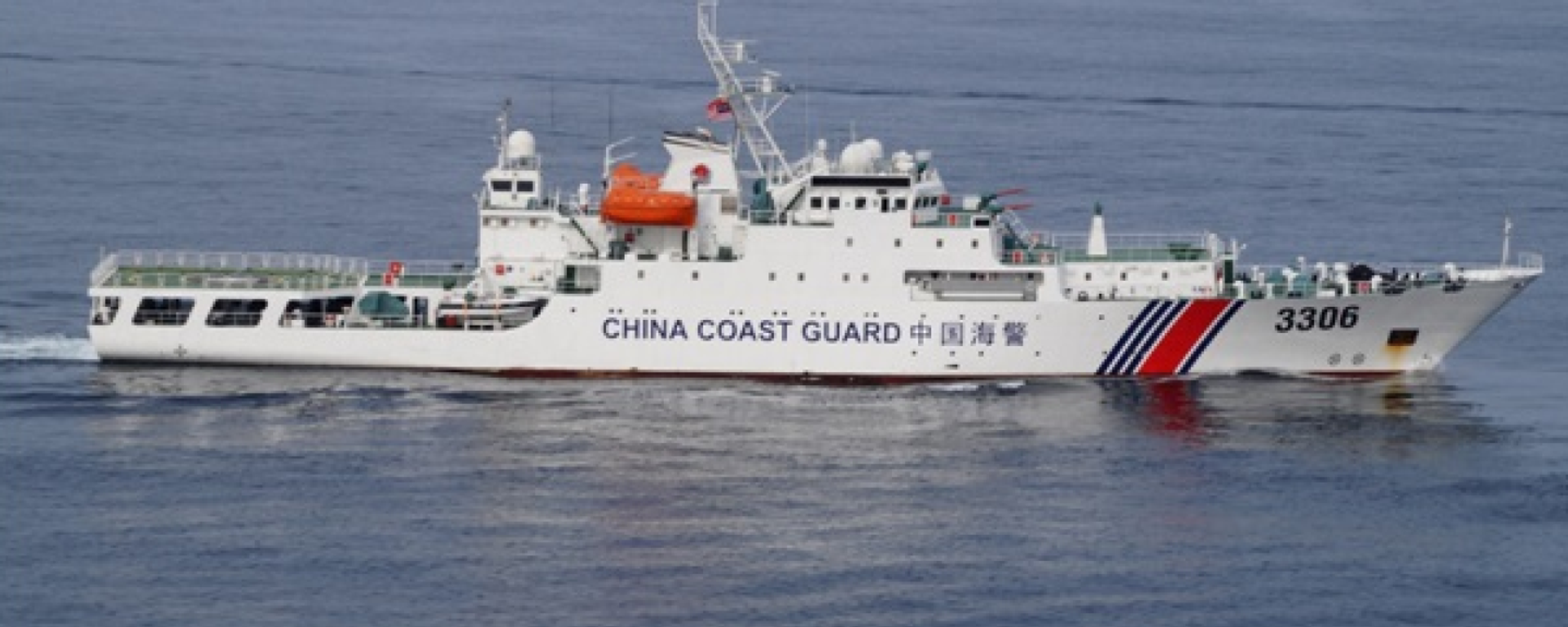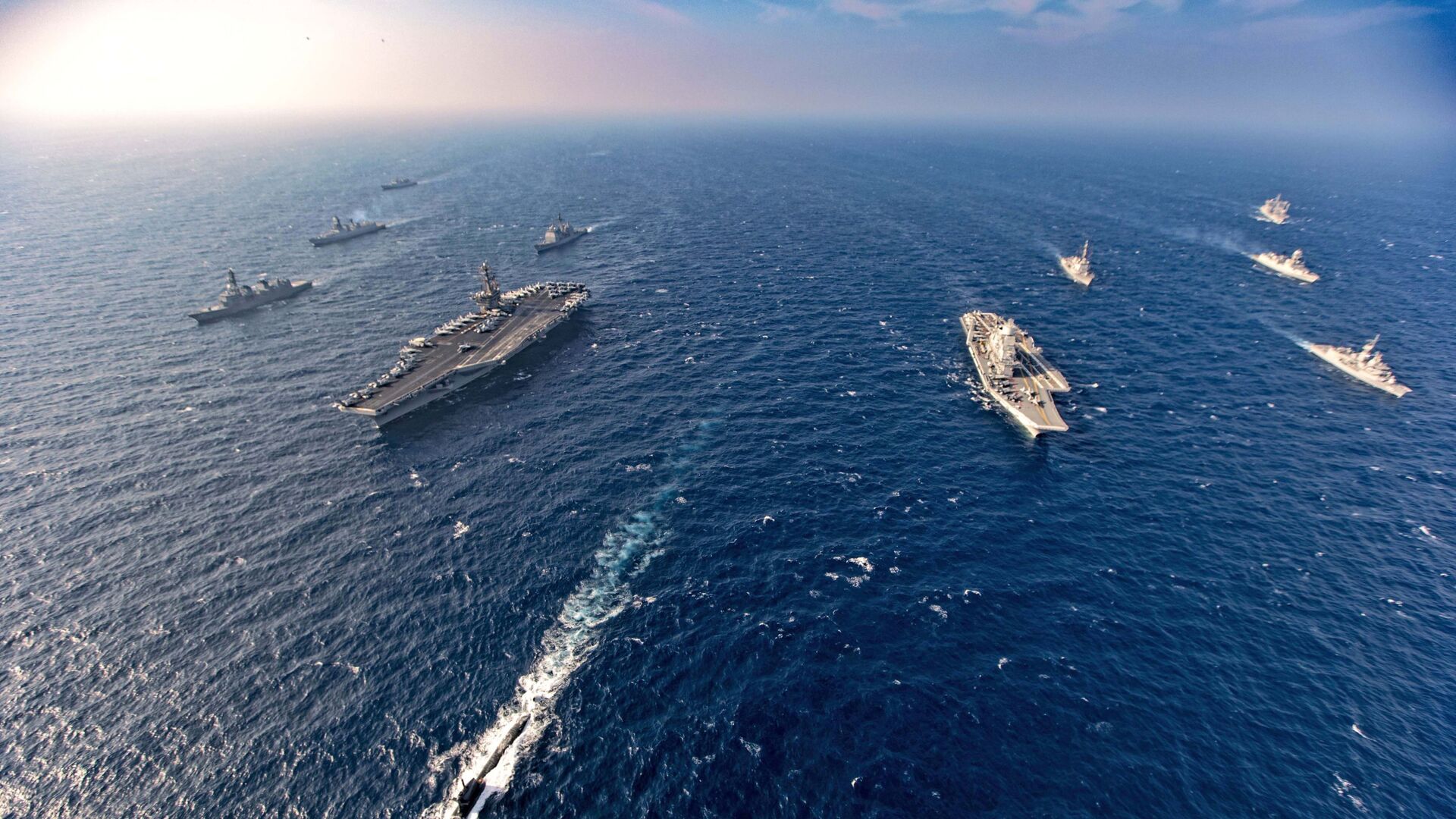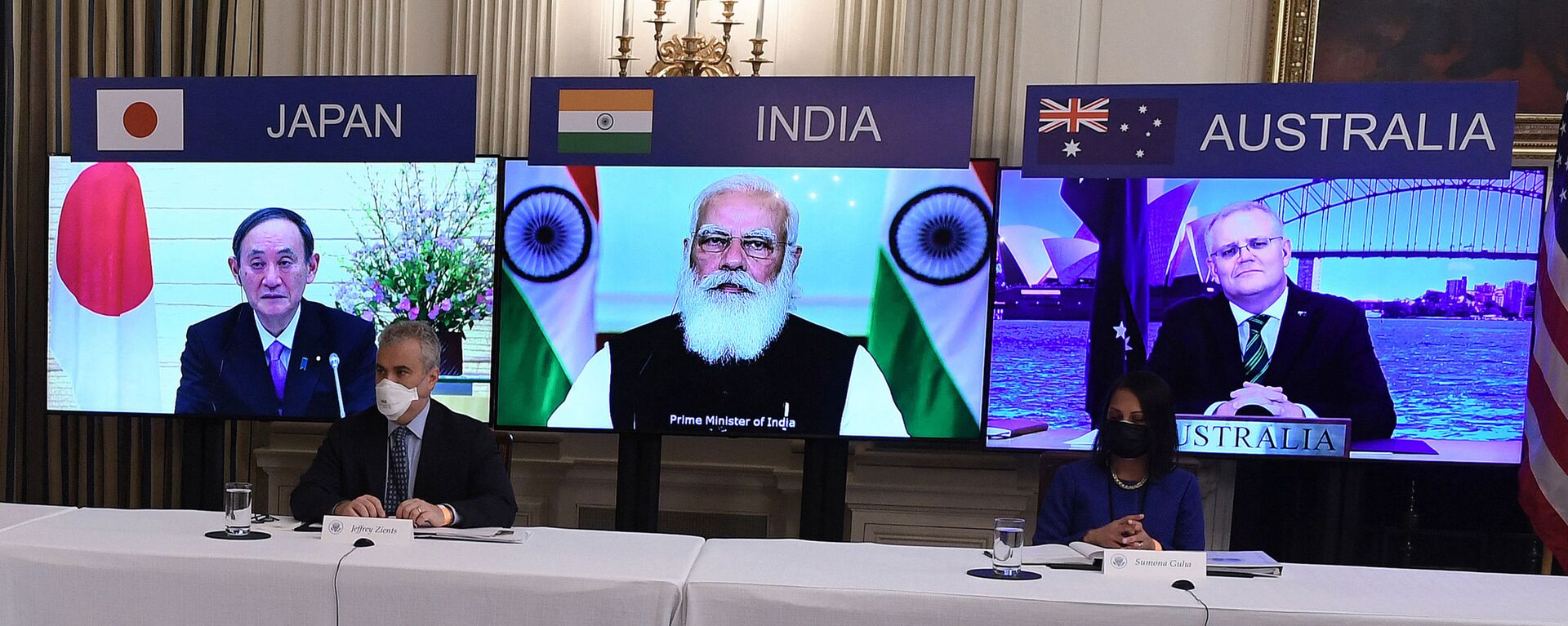https://sputnikglobe.com/20210920/japan-wants-quad-navies-to-hold-malabar-naval-drills-in-south-china-sea-1089243973.html
Japan Wants Quad Navies to Hold Malabar Naval Drills in South China Sea
Japan Wants Quad Navies to Hold Malabar Naval Drills in South China Sea
Sputnik International
The 'Quadrilateral Security Dialogue', comprising Australia, India, Japan and the US, has been described as an 'Asian NATO' by Chinese Foreign Minister Wang... 20.09.2021, Sputnik International
2021-09-20T18:39+0000
2021-09-20T18:39+0000
2022-07-19T10:39+0000
asia
japan
china
australia
south china sea
east china sea
quadrilateral security dialogue (quad)
https://cdn1.img.sputnikglobe.com/img/07e5/08/17/1083691415_0:0:3073:1728_1920x0_80_0_0_dfce1ec22aa6d0422911171e1b1d17e5.jpg
Japan backs holding the four-nation ‘Malabar’ Drills in the South China Sea to send a “strong message” to Beijing, Japanese sources have revealed ahead of the first-ever ‘Quad’ Leaders’ Summit scheduled to be held at the White House on 24 September. The comments were made by Japanese delegates involved in Tokyo’s Quad policy-making at a virtual conference organised by an Indian think-tank on Monday. The four navies have never exercised in the South China Sea.The virtual discussion, held under ‘Chatham House’ rules, was attended by defence and diplomatic veterans from Australia, India and the US, including several former top-ranking Indian Navy officers.The most recent 'Malabar' drill took place off the coast of Guam in the western Pacific ocean last month. Last year, the four-nation naval exercises were organised off India's east and west coasts.Sources further rejected "speculation" that the administration of Prime Minister Yoshihide Suga wasn't as "active" in forging multi-nation efforts against China as his predecessor Shinzo Abe. According to new rules which kicked in on 1 September, China’s Maritime Safety Administration has called upon foreign vessels to report ship and cargo information to authorities upon entering Chinese “territorial waters”. As reported by China’s state-backed Global Times, the new rules apply to submersibles, ships carrying radioactive materials, bulk oil, chemicals, liquefied natural gas as well as other toxic materials.China exercises “sovereignty and jurisdiction” over the entire South China Sea waters and rejects a July 2016 ruling by a tribunal established under the United Nations Convention on the Law of the Sea (UNCLOS), which dismissed Beijing’s maritime claims.The UNCLOS ruling came after a case was moved against China by the Philippines, which accused the world’s second biggest economy of encroaching upon the waters falling under its maritime Exclusive Economic Zone (EEZ), among a host of other charges.Besides the Philippines, China also disputes Vietnam’s conflicting maritime claims in the South China Sea.Meanwhile, in the East China Sea, Beijing and Tokyo are involved in a maritime dispute over the sovereignty of Senkaku/Diaoyudao Islands. China has rejected Japan’s proposed ‘media line’ to demarcate the sea, and claims sovereignty over much of the waters.Since the UNCLOS verdict, western and regional governments, including the US, Japan, Australia and even India on several occasions, have called for the UNCLOS to be respected.The leaderships of the Quad nations called for “the role of international law to be prioritised” in the maritime domain and jointly meet the “challenges to the rules-based maritime order in the East and South China Seas”, in the joint statement after the first-ever virtual summit in March this year.Divergences Among Quad AlliesA major point of contention among the Quad nations is the purported “focus” of the Malabar drills, Japanese and Indian sources have pointed out, identifying the four-nation exercise as the “most visible military component” of the grouping.Japanese sources also say that the Quad must also “reach out” to members of the Association of Southeast Asian Nations (ASEAN) to dispel the “deep mistrust” that some of the south-east nations have about the motives of the four-nation grouping.“The foreign ministers of the Quad still identify the grouping as a non-military alliance. It is thus imperative that the concept of ASEAN centrality is respected by keeping the bloc in the loop about any major decision. ASEAN must serve as a conduit between the Quad allies and China. At the same time, it is necessary to have them on our side,” sources pointed out.All the major world powers, including the US and even China, have backed the concept of “ASEAN-led” security architecture in the Asia-Pacific (the Indo-Pacific region), putting the 10-nation bloc at the centre of the ongoing geopolitical rivalry in the region.
https://sputnikglobe.com/20210831/new-chinese-law-requires-foreign-vessels-to-report-to-maritime-authorities-when-entering-waters-1083762227.html
https://sputnikglobe.com/20210312/modi-pledges-to-work-closer-with-quad-partners-to-advance-shared-values-in-region-1082326628.html
japan
china
australia
south china sea
east china sea
Sputnik International
feedback@sputniknews.com
+74956456601
MIA „Rosiya Segodnya“
2021
News
en_EN
Sputnik International
feedback@sputniknews.com
+74956456601
MIA „Rosiya Segodnya“
Sputnik International
feedback@sputniknews.com
+74956456601
MIA „Rosiya Segodnya“
japan, china, australia, south china sea, east china sea, quadrilateral security dialogue (quad)
japan, china, australia, south china sea, east china sea, quadrilateral security dialogue (quad)
Japan Wants Quad Navies to Hold Malabar Naval Drills in South China Sea
18:39 GMT 20.09.2021 (Updated: 10:39 GMT 19.07.2022) The 'Quadrilateral Security Dialogue', comprising Australia, India, Japan and the US, has been described as an 'Asian NATO' by Chinese Foreign Minister Wang Yi, with Beijing viewing the bloc as a Washington-led effort to contain China. Last year, the Royal Australian Navy (RAN) participated in the 'Malabar' exercise for the first time since 2007.
Japan backs holding the four-nation ‘
Malabar’ Drills in the South China Sea to send a “strong message” to Beijing, Japanese sources have revealed ahead of the first-ever ‘Quad’ Leaders’ Summit scheduled to be held at the White House on 24 September.
The comments were made by Japanese delegates involved in Tokyo’s Quad policy-making at a virtual conference organised by an Indian think-tank on Monday.
The four navies have never exercised in the South China Sea.
The virtual discussion, held under ‘Chatham House’ rules, was attended by defence and diplomatic veterans from Australia, India and the US, including several former top-ranking Indian Navy officers.
The most recent 'Malabar' drill took place off the coast of Guam in the western Pacific ocean last month. Last year, the four-nation naval exercises were organised off India's east and west coasts.
Japanese sources say that the need to send a “collective response” to China’s actions in the South China Sea has gained more momentum after the announcement of new rules requiring foreign vessels crossing the disputed water body to intimate their intentions to Beijing.
Sources further rejected "speculation" that the administration of
Prime Minister Yoshihide Suga wasn't as "active" in forging multi-nation efforts against China as his predecessor Shinzo Abe.
"Our recent dealings with China form part of our bilateral diplomacy. However, the [ruling Liberal Democratic Party] leadership remains committed to our role within the Quad. The US also continues to be our topmost ally," Japanese delegates said.
According to new rules which kicked in on 1 September, China’s Maritime Safety Administration has called upon foreign vessels to report ship and cargo information to authorities upon entering Chinese “territorial waters”.
As reported by China’s state-backed Global Times, the new rules apply to submersibles, ships carrying radioactive materials, bulk oil, chemicals, liquefied natural gas as well as other toxic materials.

31 August 2021, 19:56 GMT
China exercises “sovereignty and jurisdiction” over the entire
South China Sea waters and rejects a July 2016 ruling by a tribunal established under the United Nations Convention on the Law of the Sea (UNCLOS), which dismissed Beijing’s maritime claims.
The UNCLOS ruling came after a case was moved against China by the Philippines, which accused the world’s second biggest economy of encroaching upon the waters falling under its maritime Exclusive Economic Zone (EEZ), among a host of other charges.
Besides the Philippines, China also disputes Vietnam’s conflicting maritime claims in the South China Sea.
Meanwhile, in the East China Sea, Beijing and Tokyo are involved in a maritime dispute over the sovereignty of Senkaku/Diaoyudao Islands. China has rejected Japan’s proposed ‘media line’ to demarcate the sea, and claims sovereignty over much of the waters.
Since the UNCLOS verdict, western and regional governments, including the US, Japan, Australia and even India on several occasions, have called for the UNCLOS to be respected.
The leaderships of the Quad nations called for “the role of international law to be prioritised” in the maritime domain and jointly meet the “challenges to the rules-based maritime order in the East and South China Seas”, in the joint statement after the first-ever virtual summit in March this year.
Divergences Among Quad Allies
A major point of contention among the Quad nations is the purported “focus” of the Malabar drills, Japanese and Indian sources have pointed out, identifying the four-nation exercise as the “most visible military component” of the grouping.
Whereas India wants the Quad to make the Indian Ocean region (IOR) a priority area of its maritime operations, the same view isn’t necessarily shared in the other three capitals, it transpires. Tokyo, Washington DC, and Canberra want the Quad navies to focus on the Pacific Ocean, specifically in east Asia along China’s eastern seaboard.
Japanese sources also say that the Quad must also “reach out” to members of the Association of Southeast Asian Nations (ASEAN) to dispel the “deep mistrust” that some of the south-east nations have about the motives of the four-nation grouping.
“The foreign ministers of the Quad still identify the grouping as a non-military alliance. It is thus imperative that the concept of ASEAN centrality is respected by keeping the bloc in the loop about any major decision. ASEAN must serve as a conduit between the Quad allies and China. At the same time, it is necessary to have them on our side,” sources pointed out.
All the major world powers, including the US and even China, have backed the concept of “ASEAN-led” security architecture in the Asia-Pacific (the Indo-Pacific region), putting the 10-nation bloc at the centre of the ongoing geopolitical rivalry in the region.






